Archives
-
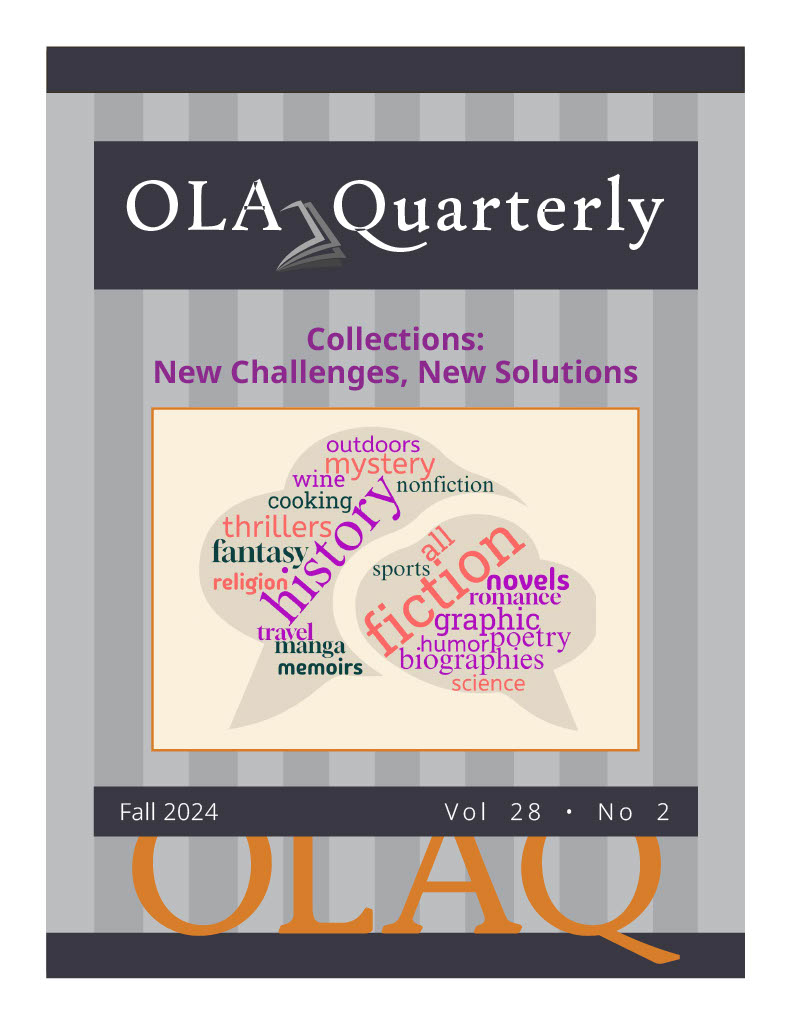
Collections: New Challenges, New Solutions
Vol. 28 No. 2 (2024)In this issue, guest edited by Le Button of the Deschutes Public Library, we learn about the new challenges facing Oregon's libraries and we discover the innovative solutions library personnel are creating to help navigate these challenges and serve their diverse communities.
-
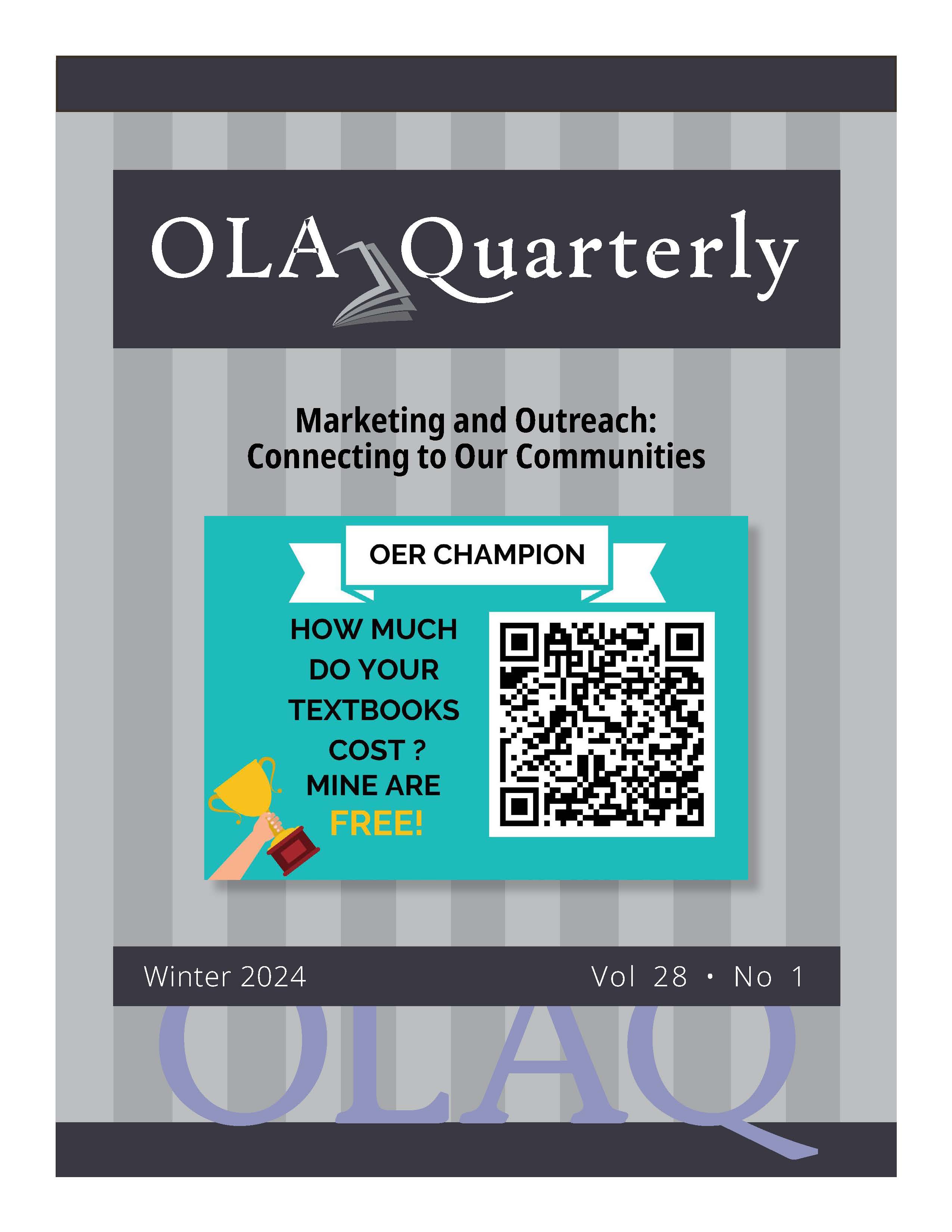
Marketing and Outreach: Connecting to Our Communities
Vol. 28 No. 1 (2024)“Marketing and Outreach: Connecting to Our Communities” is the theme of this issue of the OLA Quarterly. As we continue to shape what our library services look like post-pandemic, we are also finding a need to connect or reconnect with communities we serve. In a world transformed by the COVID-19 pandemic, libraries have emerged as resilient institutions, evolving to meet the changing needs of their communities. As we navigate the post-pandemic landscape, libraries are redefining their roles and focusing on marketing and outreach strategies that connect them more intimately with the diverse communities they serve.
-
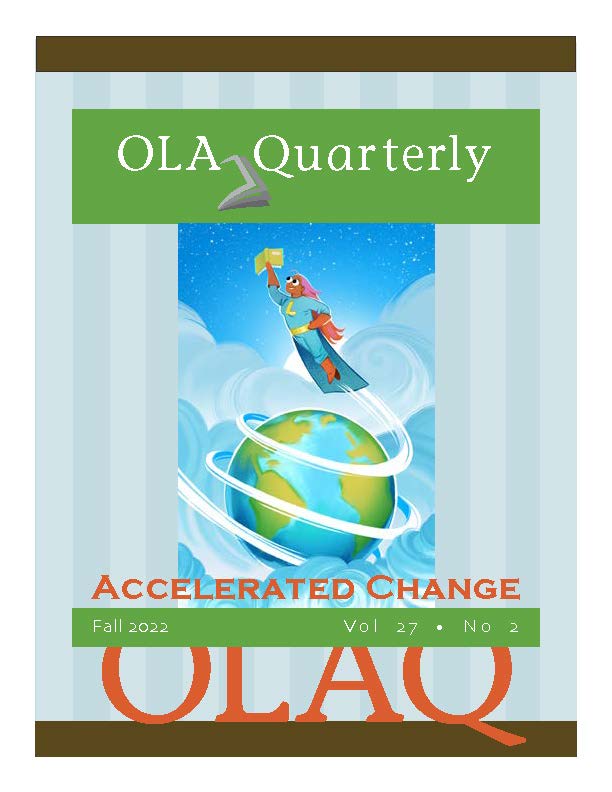
Accelerated Change
Vol. 27 No. 2 (2022)This issue of the OLA Quarterly explores “Accelerated Change”—how the disruption of the COVID-19 pandemic accelerated and encouraged positive changes in Oregon libraries. Articles illustrate how conditions of the pandemic either created opportunities to implement new ideas, illuminated the need to address known barriers to access, or provided the challenge needed to think differently about the impact of library services. Centering the rebuilding and development of new relationships with users and partners will help libraries assure sustainable services through future global challenges.
Guest Editor: Arlene Weible, OLA Past President, State Library of Oregon
Editor Biography: Arlene Weible (she/her) is the 2021-22 OLA President and the Electronic Services Consultant at the State Library of Oregon, where she coordinates the Statewide Database Licensing Program and other library projects. She has worked in Oregon libraries for over 20 years and has been in the fortunate position to observe the commitment and hard work of library workers across the state. When she’s not in meetings, she enjoys gardening, attending outdoor music events, and spending time with her extended family and elderly cat Dale.
-
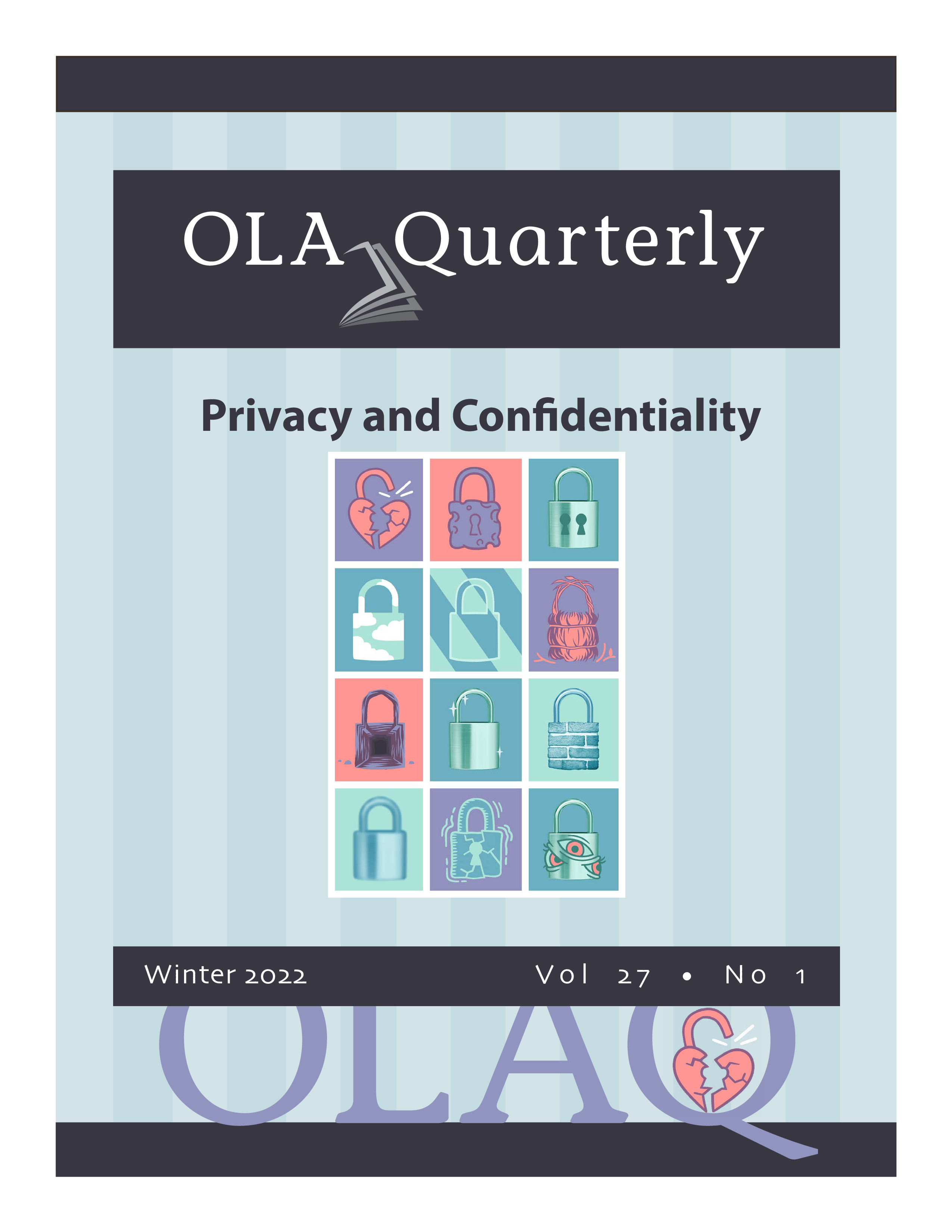
Privacy and Confidentiality
Vol. 27 No. 1 (2022)Protecting patron privacy is a core tenet of the ethics of librarianship. The American Library Association’s Privacy: An Interpretation of the Library Bill of Rights (2019) emphasizes that protecting the privacy of library users is key to ensuring intellectual free- dom because surveillance and monitoring produce a “chilling effect on users’ selection, access to, and use of library resources.” In 2005, librarians in Connecticut made headlines by standing up against the FBI and the USA Patriot Act to protect patron records (Cowan, 2006). Faced with a clear threat to privacy, these librarians sued the U.S. government in defense of their patrons’ rights. However, the daily erosion of privacy facing patrons today is often more insidious and the day-to-day work of protecting privacy in libraries is less visible.
This issue of the Oregon Library Association Quarterly is dedicated to stories of how library workers across Oregon try— and sometimes struggle—to live up to our professional responsibility to protect privacy. These stories come from all corners of our library ecosystem, from public and aca- demic institutions and from large and small communities. The articles presented here provide snapshots of some of the current challenges that libraries face around privacy, as well as some practical tips for dealing with these challenges. We have also included a short guide to relevant state laws, which we hope provides context for the issue as
a whole.Guest Editors: Ellie Avis, Multnomah County Library; Kelly McElroy, Oregon State University
Editor Biographies:
Ellie Avis (she/her) is the Collection Manager at Multnomah County Library. She is a member of the OLA Intellectual Freedom Committee and Tech Services Roundtable, and has been part of the Library Freedom Project since 2019. She holds a Master’s Degree in City Planning from UC Berkeley and is currently working on her MLIS. In her free time, Ellie enjoys making and breaking things, DIY music, and riding her bike.
Kelly McElroy (she/her) is the Student Engagement and Community Outreach Librarian and an Associate Professor at Oregon State University. She has been a member of the Library Freedom Project since 2018. Kelly loves to get people talking about things that matter, whether as a facilitator for Oregon Humanities’ Conversation Project or as an officer for her union, United Academics OSU.
-
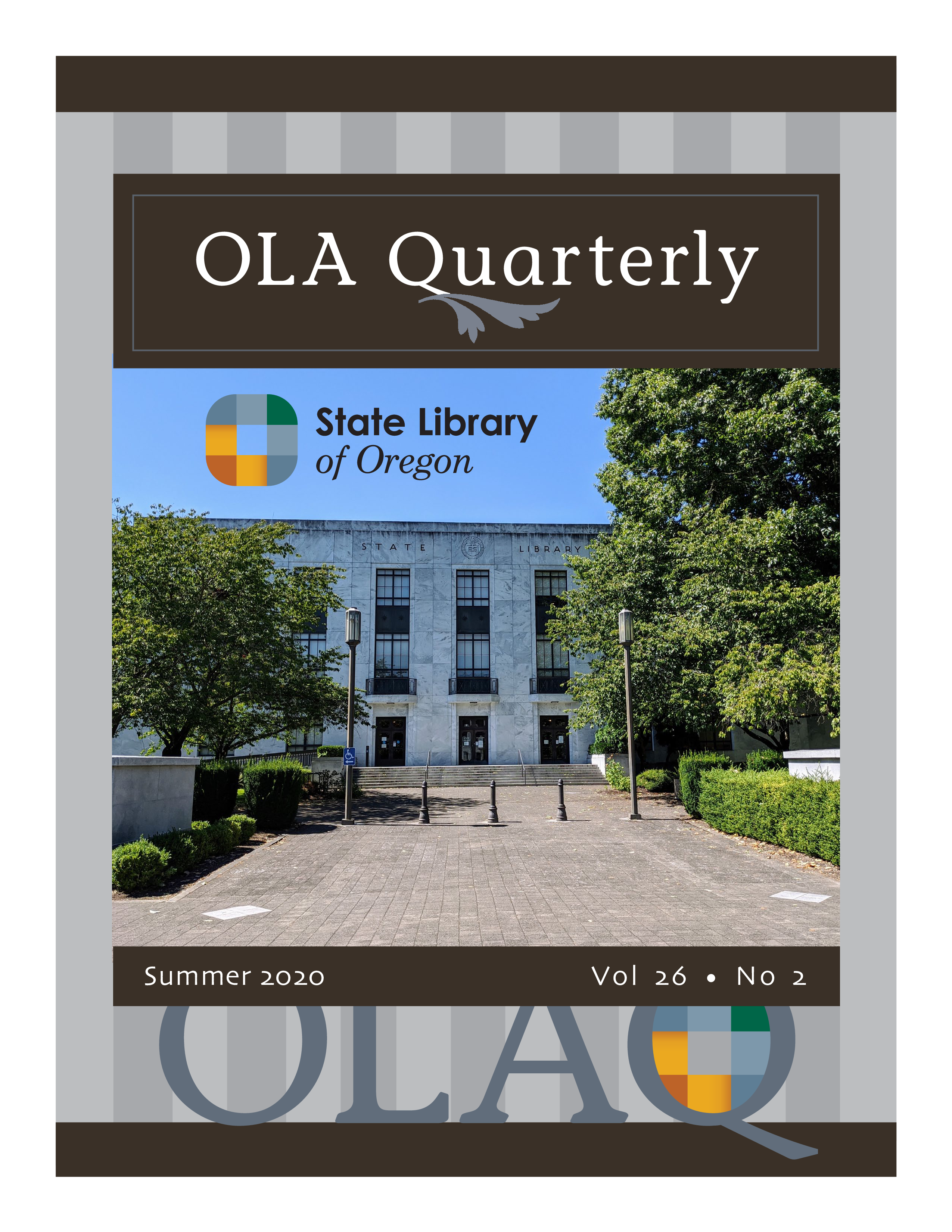
State Library of Oregon
Vol. 26 No. 2 (2020)Abstract: This issue of the OLA Quarterly features articles written by State Library staff highlighting the programs, services, and history of the State Library. The State Library of Oregon was established as the Oregon Library Commission in 1905 and renamed as the Oregon State Library in 1913. Today, the State Library of Oregon has three distinct roles:
- The Talking Book and Braille Library serves Oregonians with print disabilities by providing Braille, audio- books, descriptive videos, and magazines through the mail and digital download. This is a free service to eligible Oregonians, with over 5,000 active users and an average of approximately 30,000 items circulated every month. The Talking Book and Braille Library is the regional library in Oregon for the Library of Congress’ National Library Service for the Blind and Print Disabled (NLS) network.
- The Library Support and Development Services Division provides consultation services, professional de- velopment, statewide library services, and state and federal grant administration to libraries across the state. The division administers state-funded Ready to Read grants to public libraries in Oregon to support sum- mer reading and early literacy programs, and administers federal LSTA grant funding as competitive grants and for statewide library services including the Answerland online reference service, the Oregon School Library Information System (OSLIS), and the Statewide Database Licensing Program.
- The Government Information and Library Services Division provides library services to state employees including research assistance, professional development, and instruction. Through the embedded librarian program, each state agency is as- signed a librarian to provide specialized assistance and resources to support state agency staff in their work. The division preserves state agency publications and makes them accessible to state employees and the public through the Oregon Digital Collections website, and reference assistance is provided to the public in utilizing State Library collections and resources.
Articles featuring the work of each of these divisions are included in this issue.
Guest Editor: Jennifer Patterson, State Library of Oregon
Editor Biography: Jennifer Patterson is the Director of the State Library of Oregon (State Librarian). She has over twenty years of library experience working in public, academic, and special libraries in California, Colorado, and Washington State before joining the State Library of Oregon in 2019. She has a houseful of pets and enjoys hiking and exploring the beautiful Pacific Northwest with her family. You can reach her at jennifer.l.patterson@slo.oregon.gov.
Note: A new version of this issue's PDF was posted on Nov. 6, 2020, to include updated State Library of Oregon email addresses.
-

Connecting to Community Through Collections
Vol. 26 No. 1 (2020)Abstract: I embarked upon this project because I was curious about how special collections could help forge strong communities, as well as how these community impacts could be effectively communicated and demonstrated. The plethora of articles received has taught me a lot.
What stood out the most for me when I read the submissions was the huge variety of communities served by special collections in Oregon. To help me take in all the different types of collections out there, I’ve binned them into broad (and sometimes overlapping) categories.
- Described by Nancy Hoover, the Center for Volga German Studies is a good example of a collection that serves a scholarly community.
- Other collections serve enthusiastic hobbyists.
- Many collections serve to help preserve the history, heritage or contributions of particular communities.
- There are some notable collections described in this issue that branch out to address unique community needs.
Guest Editor: Karen Clay, Eastern Oregon University Library
Editor Biography: Karen grew up in Canada, where she obtained a Masters degree in Engineering, followed immediately by an MLIS. Her first positions as a Librarian were at the International Institute for Sustainable Development and at Atomic Energy of Canada Ltd. She has been the Library Director at Eastern Oregon University since July 2006. The EOU Library was extensively renovated in 2012, and ever since Karen has been hoping for an opportunity to organize and showcase the Library’s special collections. Learning about the breadth of special collections covered in this issue has given Karen the inspiration to apply for grant funding to work with EOU’s special collections and uncover whatever gems are hidden there.
-

Youth Services Take Over OLA Quarterly!
Vol. 25 No. 4 (2019)Abstract: This issue fulfills a goal to highlight youth services librarianship in Oregon, and to dedicate one full volume to celebrating what we are doing now, what we hope to do in the future, and ways that we are changing the emotional, intellectual, and literary landscape of the lives of children and teens. It’s a great mix of articles, and I’m proud of each of the authors. I appreciate their time and efforts, both in their daily work and in their contribution to the written field of librarianship practices and philosophy.
We are practicing all the good stuff of librarianship: programming, collection development, readers’ advisory, activism, reference assistance, and engagement that is all combined into the important work every librarian does. Add in the elements of intellectual freedom (which are, of course, also of note for non-youth services librarians), privacy rights for patrons under the age of 18, the programming fun and challenges of working with youth, and code-switching to connect with kids, tweens, parents, educators, and our own non-youth oriented librarian peers, and you’ve got the quintessential youth services librarian. You’ll find each of those features represented in this issue.
Guest Editor: April Spisak, Albany Public Library
Editor Biography: The Albany Public Library has an incredible staff, a fabulous collection, and summer reading stats that will knock your socks off. April Spisak is quite happy to be part of it all as Head of Youth Services. Given that her only skills are all word related, it is quite fortunate indeed that her dream job uses so many of them in myriad ways.
-

Equity, Diversity, and Inclusion
Vol. 25 No. 2 (2019)Abstract: Equity, diversity, and inclusion (EDI) are at the center of our work in libraries. A cornerstone of democracy, libraries provide free and open access to services and resources for everyone in our local communities. This year EDI is a specific area of focus for the Oregon Library Association (OLA), and related initiatives include this issue of OLA Quarterly (OLAQ), the development of an EDI Plan for the association, and setting Equity, Diversity, Inclusion as the annual conference theme to provide a concentrated opportunity for OLA members to engage in related conversations. Together OLA is exploring EDI in its many connotations and intersections, including race, ethnicity, gender, sexual orientation, socioeconomic status, age, physical and mental abilities, body size, religious beliefs, political ideologies, and geography.
This issue shares the important work that a wide variety of libraries are doing to help create equitable and inclusive communities in Oregon. It includes contributions from public, academic, and school libraries, and authors include staff, librarians, administrators, and graduate students in library and information science.
Guest Editor: Elaine G. Hirsch, Lewis & Clark College
Editor Biography: Elaine is the Associate Director of Watzek Library at Lewis & Clark College and currently serves as OLA President. OLA has been the focus of Elaine’s professional service for over twenty years and she is constantly inspired by her innovative, socially conscious, and dedicated association colleagues. Her MLS is from Indiana University.
-

Future Organization of Things
Vol. 25 No. 1 (2019)Abstract: Oregon librarians are on track with current developments in technical services, but that is no simple task. This issue of OLAQ is dedicated to cataloging, metadata, archival description, and all the various ways we organize our collections. Authors reveal their thoughts on the practical implications of future cataloging methods, faceted vocabulary, and new tools. They share tales of migration and automation, implementing new discovery layers, optimizing access to open educational resources, providing affordable training, and more. In this incredibly instant culture, our work is crucial in providing efficient access to information resources. Come explore the important, yet oftentimes invisible, work of organizing things. What does the future hold?
Guest Editor: Rachel "Ray" Zill, Oregon State University
-

Digital Repositories and Data Harvests
Vol. 24 No. 4 (2018)Abstract: Today it’s hard to imagine life without a smartphone, but broadcast television, travel to the moon, MARC records, personal computers, email, the Internet, online library catalogs, cell phones, video on demand, virtual reality, and digital archive collections all came about in one human generation.
Throughout that generation of disruptive and innovative technologies, librarians have served the public good by providing the conceptual skills to organize and describe information and provide or facilitate access to it. Moreover, libraries, through cooperatives and information sharing agreements, have made possible the construction of massive data systems that serve our nation’s needs with respect to heritage content, contemporary awareness and future planning.
And that’s the foundation of this special issue of the OLA Quarterly on digital repositories and data harvests. In this issue, experts from Oregon’s libraries, Larry Landis (OSU), Mark Dahl and Zachariah Selley (Lewis & Clark), Sarah Seymore (UO), Becca Evans (SOU), Julia Simic (UO) and Ryan Wick (OSU), Beth Dehn (Oregon Heritage Commission), and Ross Fuqua and Arlene Weible (Oregon State Library) describe their work to develop important collections that have been or will be harvested and shared broadly with users throughout the world. These aren’t siloed collections that live solely in a local database or on one institution’s server. These are world-class collections, shared globally to enrich human existence.
Guest Editor: Maureen Flanagan Battistella, Southern Oregon University
Editor Biography: A librarian by training and inclination, Maureen now has a faculty appointment as Assistant Professor Associate in the Sociology and Anthropology program at Southern Oregon University. Her research interests include heritage preservation, agricultural succession and land use planning. She is the curator of the Stories of Southern Oregon project published on YouTube and in the Southern Oregon Digital Archives at Southern Oregon University. The Stories project has been funded by the Oregon Heritage Commission, the National Endowment for the Humanities, and through a Library Services and Technology Act (LSTA) Competitive Grant from the Oregon State Library.





